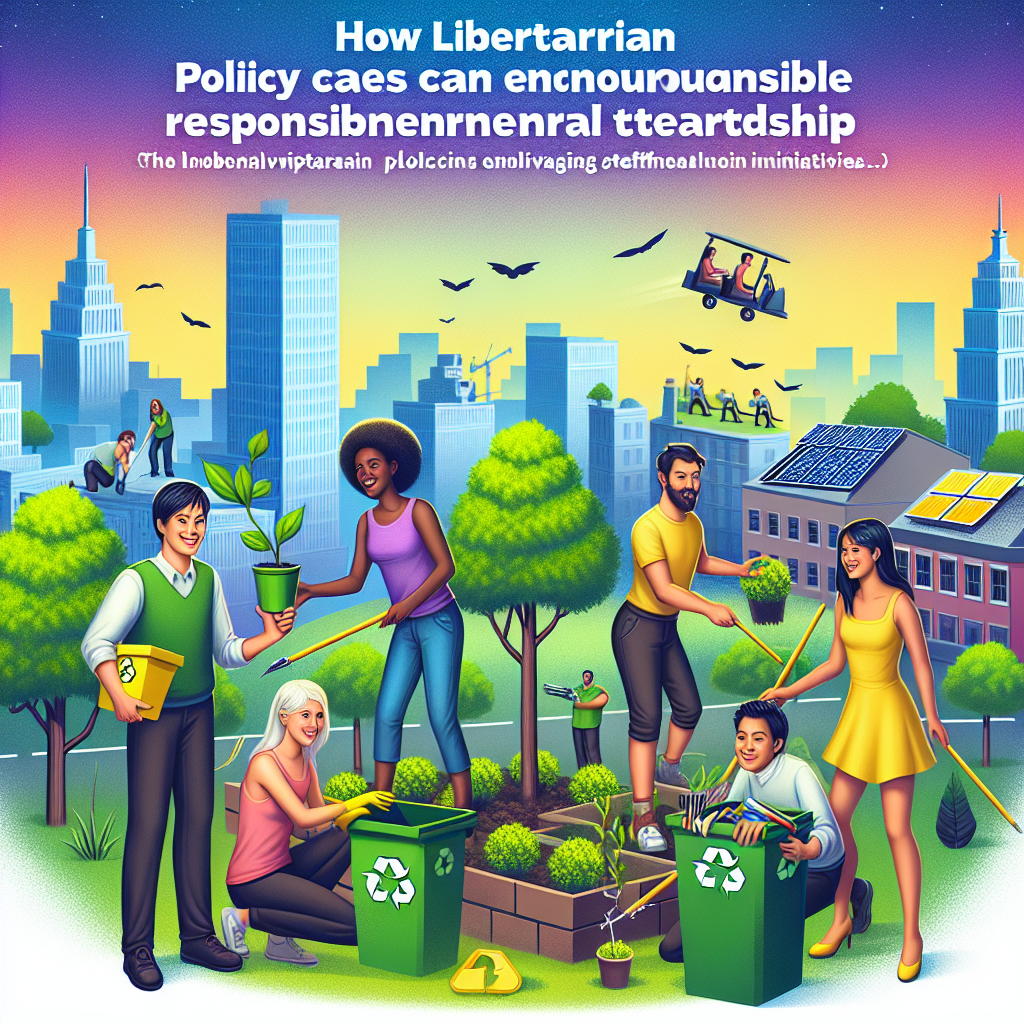How Libertarian Policies Can Encourage Responsible Environmental Stewardship
The debate surrounding environmental protection and sustainable practices often invokes various political ideologies. Among these, libertarianism offers a unique perspective that emphasizes individual freedoms, personal responsibility, and minimal government intervention. While some may assume that libertarian policies may neglect environmental concerns, the reality is that they can foster a culture of responsible environmental stewardship. In this article, we explore how libertarian principles can lead to innovative environmental solutions.
1. Emphasis on Personal Responsibility
One of the core tenets of libertarian philosophy is the belief in personal responsibility. Libertarians argue that individuals should be accountable for their actions, encouraging people to make environmentally conscious decisions. By promoting personal responsibility, libertarian policies can inspire individuals and communities to take ownership of their environmental impact. This approach can result in better resource management, waste reduction, and cleaner living environments.
1.1 The Impact of Volunteerism
Libertarians often advocate for voluntary action rather than government mandates. By encouraging community-led initiatives and volunteerism, individuals can come together to address environmental challenges. For instance, small communities can organize clean-up drives, tree planting days, and educational campaigns, thus fostering a sense of collective responsibility towards the environment.
2. Market Solutions to Environmental Issues
Libertarian policies prioritize market solutions as a means to address environmental issues. Instead of relying on government regulations, libertarians argue that free markets can lead to innovative and efficient environmental solutions. When businesses and individuals have the freedom to operate without excessive regulation, they are more likely to find creative pathways to reduce waste and enhance sustainability.
2.1 Incentivizing Innovation
In a free-market economy, companies are driven by profit motives. By allowing them the freedom to innovate, firms can develop new technologies and practices that promote environmental stewardship. For example, renewable energy companies can thrive in a competitive landscape that rewards efficiency and sustainability. This competition can lead to advancements in solar, wind, and alternative energy solutions, ultimately benefiting the environment.
3. Property Rights and Environmental Protection
Libertarianism places a strong emphasis on property rights, which can significantly impact environmental stewardship. When individuals and businesses have clear ownership of land and resources, they are incentivized to manage them responsibly.
3.1 The Tragedy of the Commons
The “tragedy of the commons” illustrates how shared resources are often overexploited. Libertarian policies advocate for privatization and clear property rights to mitigate this risk. When landowners are responsible for their own resources, they are more likely to engage in sustainable practices. For example, a farmer who owns a stretch of land has a vested interest in maintaining soil health and biodiversity, recognizing that their livelihood depends on the quality of their environmental stewardship.
4. Reducing Government Overreach
Libertarians argue that excessive government regulation can hinder environmental progress. Many regulations can stifle innovation, increase costs, and lead to bureaucratic inefficiencies. By reducing unnecessary governmental involvement, libertarian policies can create a more conducive environment for both businesses and individuals to engage in responsible environmental actions.
4.1 Encouraging Collaboration
Without cumbersome regulations, companies are more likely to collaborate with environmental groups and local community organizations. This collaboration can lead to the development of best practices and improved sustainability measures, leveraging both market-driven solutions and community-driven initiatives.
5. Environmental Education and Awareness
Libertarian policies encourage educational initiatives focused on environmental stewardship without relying on government mandates. Informing individuals about their choices and the impact they have on the environment is essential for fostering responsible environmental behavior.
5.1 Promoting grassroots movements
By empowering grassroots organizations and local communities, libertarian policies can facilitate educational programs that emphasize the importance of environmental responsibility. Workshops, seminars, and community events can help raise awareness around topics like recycling, conservation, and sustainable living practices.
Conclusion
Libertarian principles may not fit the conventional mold when it comes to environmental protection, but they offer a compelling framework for encouraging responsible environmental stewardship. By emphasizing personal responsibility, promoting market solutions, and enhancing property rights, libertarian policies can inspire individuals and businesses to take proactive steps toward a healthier planet. In today’s world, where environmental challenges loom large, embracing innovative political ideologies can lead to sustainable solutions that benefit both individuals and the environment alike.
Share this content:












Post Comment